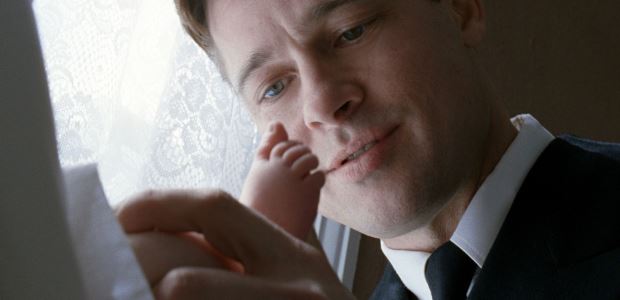Few films can compete with the magnificent ambitions of Terrence Malick’s Tree of Life. It is perhaps the only film in recent memory that spans from the beginning of time to the end of the universe. That it finds the space and breadth to show us an intimate, personal, sometimes scattershot story of three boys growing up in Texas during the 50’s is quite extraordinary.
At once about many things and yet something quite specific, the centerpiece is a story about the O’Brien children and the growing pains of living up to the demands of their strict disciplinary father (a brooding Brad Pitt), authoritative to a fault. Beautiful and elegant with its indelible imagery and full of ideas, my mind found it hard to look away even while my thoughts battled to keep up with the endless montage of seemingly disconnected sequences that represented the many phases of life — birth, growth, love, rebellion, guilt, death. The film is in fact a requiem for the past and its entire synthesis is triggered by a scene early on where Jack (Sean Penn, playing the eldest son as an adult) remembers the day his family learned of the death of his brother.
Tree of Life‘s concepts are overarching and it is grand in scale to the point where it seems fallible — something that has always threatened all of Malick’s previous films as well. Having by now perfected his elliptical, perceptive style, heavily reliant on internal monologues that sound like hushed prayers and a non-conventional narrative devoted to exploring the natural surroundings of the story as intimately as the actors that inhabit it, the film furthers this unique approach to unprecedented levels. The segment most likely to confound viewers is one that digresses from a pivotal moment in the storyline, where the family first learns of the demise of the second son, and takes us back, literally, to the formation of the world.
As astonishing in its realization, beauty, and insight as it might be, it is still reasonable to question why a film that largely functions as the memories that form when reminiscing about the past, should go all the way back and show us, in a careful mashup of creationism and evolution, the very beginning of life itself. In retrospect, it adds perspective, telling us about our rightful place in the birth of the violent cosmos, and reaffirming the notion that, in the span of things, we are mere specks. Such ideas may seem obtuse or silly to those not used to Malick’s body of work, largely consisting of equally challenging films that fully utilize the core ingredients of filmmaking — sound, visuals, editing — but to the informed viewer, it adds greater appreciation for the director.
Intimately opening up his own childhood and laying it bare for viewers (many of the things that happen seem to be wrought from the inner workings of a subjective past), Malick’s anecdotal script is rivetingly composed of events that will seem like universal truths to many — the idleness of youth, the discovery that our world is a mysterious, enigmatic and sometimes confusing place. Tree of Life has many achievements, but for the inquisitive mind it’s the encapsulation of all of these feelings into its dense structure that is most striking. Note how the film effortlessly shifts from scenes of dinner table conflicts, where the father near-hits a son for interrupting him, to the unadulterated joy of finding out that he is away on a trip and they are now liberated.
For Malick aficionados it’s worth noting that despite feeling like a culmination of all of the director’s unique motifs, Tree of Life is also the first film in his inimitable repertoire to have scenes set in the present and they are as sterile and cold as anything you’d expect from the point of view of someone who yearns for and respects natural surroundings. Detached from the formal methods of film creation, his work may seem lose, unstructured and brooding to some for all the wrong reasons, but there is no denying it is exquisitely realized and never undisciplined. If nothing, it makes all the effects based, 3D/CGI garbage being released week after week at cineplex’s look meaningless and hollow. Tree of Life not only demands careful viewing, but even more time contemplating about it.
Rating: 




